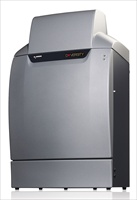Channels
Special Offers & Promotions
CCD System is up to 10 Times Faster than Laser Scanner for IR Image Analysis New Study Shows G:BOX Chemi IR6 Rapidly Captures Western Blot Images
 Syngene, a world-leading manufacturer of image analysis
solutions, today announced the results of a head-to-head study carried out at
the University of
Cambridge to demonstrate
that the G:BOX Chemi IR6
can produce images of IR labelled Western blots up to 10 times faster than
laser based scanning.
Syngene, a world-leading manufacturer of image analysis
solutions, today announced the results of a head-to-head study carried out at
the University of
Cambridge to demonstrate
that the G:BOX Chemi IR6
can produce images of IR labelled Western blots up to 10 times faster than
laser based scanning. The G:BOX Chemi IR6, which is Syngene's new multi-application CCD imaging system for analysing IR and fluorescently stained proteins, was tested against a laser based scanner. Both imagers were tested side-by-side in a comparison study at the University of Cambridge for analysing proteins on Western blots labelled with DyLight® 680 and DyLight® 800 dyes (Thermo Fisher Scientific).
The results, detailed in Syngene's Application Note 62, show that using the G:BOX Chemi IR6 with Epi Red lighting and a 705nm filter, an image of DyLight 680 labelled bands can be captured in just 20 seconds. With Epi LED IR740 lighting and a LY800 filter, an image of the DyLight 800 labelled proteins can be generated by the G:BOX Chemi IR6 in two minutes. In comparison, the laser based scanner can take more than 10 times longer to image DyLight 680 and twice as long to image DyLight 800. The systems had comparable sensitivity, with both their limits of detection being 0.11µg.
Lindsey Bunn, Syngene's Application Specialist explained: "With laser-based scanners imaging times are determined by scanning resolution and intensity setting, whereas using a G:BOX Chemi IR6, imaging times only depend on sensitivity. This is why we believed our CCD system would be faster than and just as accurate as a laser based system and are delighted that the results of the study have proved this."
Lindsey continued: "The added benefit with the G:BOX Chemi IR6 is the system can analyse all commercial fluorescent, chemiluminescent and visible dyes as well, making it a more cost-effective purchase. Researchers who need to rapidly produce images of multiplex labelled Westerns but whose labs don't have the budget for an expensive laser scanner should consider testing a G:BOX Chemi IR6 system today."
For more information visit www.syngene.com
Media Partners


